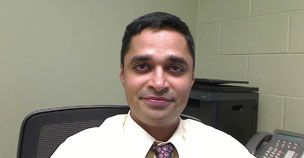NIH grant helps USF pharmacy researcher further define mechanisms of arrhythmias
The National Institutes of Health awarded researchers in the USF College of Pharmacy $1.65 million to further study the mechanisms that cause cardiac arrhythmias and the roles potassium channels play in the heart.

Srinivas Tipparaju, MPharm, PhD, assistant professor in the College of Pharmacy, is the principal investigator on the 5-year study from the National Heart, Lung and Blood Institute. Co-investigators are Aruni Bhatnagar, PhD, and Oleg Barski, PhD, both from the University of Louisville.
The grant, titled “Redox Regulation of Kv channels,” aims to advance the understanding of how potassium channels in the heart may be sensing pyridine nucleotide changes. Dr. Tipparaju will utilize in vivo and in vitro models to further understand the role of potassium channel subunits (Kvbeta subunits) and investigate the pathophysiological significance of the auxiliary subunits. Research in this field suggests that the auxiliary subunits interact with the potassium channels. However, the precise physiological significance remains unclear.
The role of pyridine nucleotides in heart disease, specifically related to loss of blood flow, lead to myocardial ischemia and abnormal beating of the heart. Earlier work by Dr. Tipparaju and coworkers show that pyridine nucleotides may play a major role in affecting the ion channels, which may reduce blood flow and lead to myocardial ischemia and abnormal beating of the heart. Research in Dr. Tipparaju’s laboratory has also demonstrated that Kvbeta subunits have a catalytic property and this provides uniqueness in which they alter potassium channels function by enzymatic activity. Dr. Tipparaju’s research will focus in understanding the complex relationships between ion channel functioning and electrical properties in the heart.
“We have made significant strides in developing the understanding for redox regulatory roles of pyridine nucleotides from a potassium channel perspective with focus leading to mechanistic links between heart disease and death,” Dr. Tipparaju said.
“Results from this new research could lead to both therapeutic strategies and future research strategies for preventing heart disease and fatal arrhythmias.”

